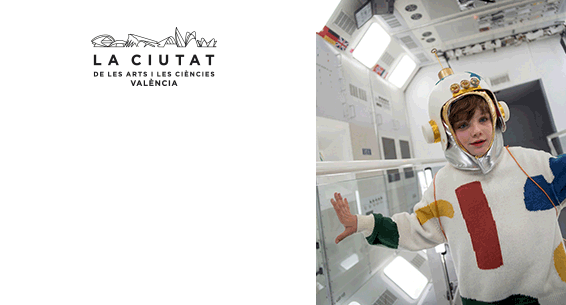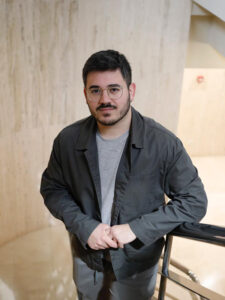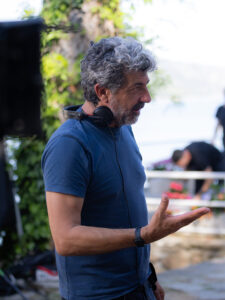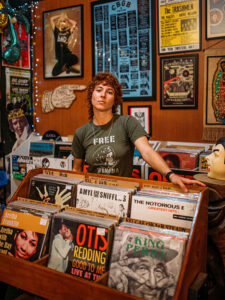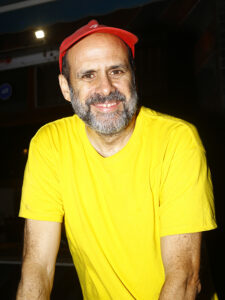
The Valencian writer Santiago Posteguillo gives us an interview, that has recently been published And Julia challenged the gods (Planet), continuation of his previous novel Yo, Julia (Planet Award 2018). Posteguillo is a professor of language and literature at the Universitat Jaume I of Castellón, studied creative literature in the United States and linguistics, discourse analysis and translation in the UK. Doctor by the University of Valencia, He has given seminars on historical fiction at various European and Latin American universities., and in 2015 The Generalitat Valenciana proclaimed him writer of the year. Among his published work, highlights his trilogy Africanus (2006-2009) on Scipio and Hannibal, the trilogy about the emperor of Hispanic origin Marcus Ulpius Trajan (2011-2016), and his three volumes of stories on the history of literature. It has been awarded by the Cartagena Historical Novel Week, won the Valencian Community Letters Award in 2010 and the Barcelona International Historical Novel Prize in 2014. GINÉS J. VERA.
A turning point in the life of Julia Domna, the protagonist of And Julia challenged the gods, It is his arrival in Britain. She arrives in perfidious Albion as the emperor's wife and abandons her as a widow and mother of two co-emperors., Antonino (who would later be Caracalla) and Publius Septimius Geta. Tell us about that period of Julia.
Yeah, indeed, Britannia is a special place in Julia's life. One might think that being a border place, far from Rome, It is not an enclave conducive to big changes, But at the beginning of the 3rd century the center of the Roman Empire ceased to be Rome and was wherever the imperial family was located., because the power resides in those moments within that family that rules the world. And this is even more evident with a dynasty like Julia's that travels together everywhere. If the emperor Severus, his wife Julia and the two Caesars. Antoninus and Geta, They are in Britain, there is then the center of power of Rome. And there, In the midst of the two brutal campaigns against the Picts, family drama breaks out: Severo will die and Julia's two sons begin their tense confrontation to control the empire without counting on the other.. That's why I decided to travel to Hadrian's Wall in the north of what is now England., to see on site those spaces and landscapes where those enormous changes in Julia's life were forged.. A trip of this type loads me not only with data, but also emotionally to enter into writing well placed in the situation.
We would also be interested in knowing that mythological point that appears in And Julia challenged the gods. Some passages about gods and their later connection with the story of Julia Domna.
in the novel And Julia challenged the gods I incorporate the gods as characters who interact with Julia and other protagonists of the story in the same way that this occurs in the story. Iliad o The odyssey. It is about, on the one hand, with a nod to the work of Homer and, for another, incorporate the gods, in Hades, the Roman underworld and even Olympus allows me that when Julia reaches the end of her days, the novel does not stop, but that we can continue with it in the afterlife, but in a roman kingdom of the dead, consistent with what the Romans themselves thought. This, besides, allows me to give the end of Julia's life the epic ending that her story deserves, because Julia's great victory was post mortem: ensuring that his dynasty remained in power after his death. The mythological part allows me to tell all this in a spectacular and rarely used way.. It has been a narrative challenge that, nevertheless, many readers seem to like it.
Apparently, Antoninus was happy, understanding and affable during his childhood, but the weight of responsibility and perhaps that of circumstances made him energetic, vengeful, proud and violent. I don't know if there is any way to place certain past acts within a current context that justify those attitudes.. Tell us about it, for example, also knowing that Caracalla raped his cousin with the acquiescence of the Praetorians..
A day in Rome, in the Palazzo Massimo alle Terme, next to the baths of Diocletian, a very little visited museum, but the one I went to because it has a large collection of statues from the Julia dynasty, I was stunned to observe a radical change in the representation of Caracalla's face: In the statues of a child or adolescent he did not have any frowns, but a smooth and clear mind, but in those in which he was already a young man, but not older, He had deep wrinkles between his eyebrows that drew attention.. It is said that the face is the mirror of the soul. I asked myself that morning: What happened to Caracalla to develop such a worried frown on his face in such a short time?? Do your research and find out., and that is the argumentative basis of much of And Julia challenged the gods. In fact, the subtitle of the novel is: When the enemy is your own son... is there victory?
In one of the scenes, Julia Domna asks her son Antonino not to speak ill of his father. Despite reminding him not to be too skilled with palace affairs, yes it is on the battlefield dealing with three civil wars and several clashes with the Senate. Nobody is perfect, he tells her. I imagine it's like Julia Domna's own life., there are lights and shadows. Perhaps historians partly have the task of valuing and impartially relativizing those lights and shadows of historical figures so that we see them as they were??
Historians have, definitely, that work, but his historical revisions, His essays and research articles reach only a small and specialized audience. The task of making hundreds of thousands of readers aware of historical figures like Julia who, because of her status as a woman, had been largely silenced in the historical narrative falls to the historical novelists. The novelist manages to reach many more people with his works and, frequently, can influence the thinking of a society more vehemently than a historian. This is, on the other hand, a huge responsibility. That is why I try to document my novels very well so that the data I convey to readers, in fictional form, be as reliable as possible. In that way, I know that I can recover a historical figure like Julia, doing her justice and without altering the veracity of the events I recount..
It is inevitable to stop talking about what is disrupting us these months. But I want to do it from the perspective of an empire as powerful as the Roman Empire and when they had to deal with the epidemics of the time.. Throughout its history, I believe it was hit by some of the worst epidemics recorded until it decimated the population.. Tell us about it and the work of doctors at that time when, for example, autopsies could not be performed., as Galen would have liked to do, although in the past yes.
The Roman Empire in Julia's time had already faced terrible smallpox virus pandemics.. The Romans called it the plague, but it has nothing to do with the bubonic plague typical of the Middle Ages and transmitted by rats. The “plagues” of the Roman period of Julia were very acute outbreaks of the smallpox virus. We know this precisely because of the very detailed description made by the imperial physician Galen of the symptoms of that disease.. And we also know, what, indeed, It decimated the population on more than one occasion with brutal mortality rates., much higher than those of the current coronavirus. The Romans will learn to separate the infected quickly, under the direction of the doctor Galen and to subordinate political power to the doctor, but all with a very fast response to an incipient pandemic. there is, in that very quick reaction at the beginning of a pandemic, definitely, a lesson to learn for what has happened to us today. Of course, Galen, once the infected were separated from those who were not infected, gave medical care to all the sick, taking extreme care that those who treated the infected did not get together with other people who were healthy.


